#heteronomal?
Explore tagged Tumblr posts
Text

Egunerokoak -komiki zahar-06
#heteronomal?#gaua#alkola#egunerokoak#~politics is about everyday life~ really???#lost#euskal -aisaldi- tipikoa#drawing#everyday#life#galtzagorri
5 notes
·
View notes
Text
There are some ships that you just know would be 100% canon if they were an M/F ship, and that's mainly what pisses people off the most in these situations.
It isn't just about the ship; it's also very much about the homophobia (whether the creators know it or not) that is preventing the ship from being canon when they otherwise would be.
(Addition.)
#(@ Antis: DNI. KEEP MOVING! I know many might like this post but y'all ain't welcome here! 👋🏽)#I know this happens with F/F ships but I mostly see it with M/M ships and I think toxic/fragile masculinity has something to do with it.#Even from woman writers. It's these pre-conceived things we're fed about what men should be. 🙄#So I was going to say ''If they weren't both men'' but I decided to let this post be fully accessible.#(Also I feel like people would yell at me for that. 😟 Even though it's... just where I see this issue happening the most. 🤷🏽♀️)#stuilly#romancek#sterek#hartwin#harringrove#nygmobblepot#chadthan#subscorp#stucky#stony#blerena#dan x chuck#julie x helen#lgbtq media#lgbtq representation#homophobia#heteronomativity#I'm not *absolutely certain* about Hartwin since so many people have an issue with their age gap. (Even though Eggsy is A GROWN MAN. 🙄)#txt
3K notes
·
View notes
Text
Case should be closed based on this alone
#byler#stranger things#byler endgame#all it takes is Mike or Will saying crazy together next season#and it’s over#i stand by the fact#that the long pause after the crazy together scene#is meant to convey that this is romantic#the reason being bc if this was a girl/boy or just mike/el#EVERYONE would have been watching it thinking OMG THE TENSION THEY SHOULD KISS#it’s put there to force you to endure this moment with them and question it beyond what’s there#and within the context of the word crazy throughout the series#that proves it to the highest degree#heteronomativity#it’s a bitch
631 notes
·
View notes
Text
A probably unintented(?) but very funny thing resulting from the Welcome Home update happening in March:
You know how popular holidays are replaced by made-up similar holidays that are each associated with one of the characters? Sally with Halloween/Macabre Menagerie, Wally and/or Home with the Homewarming... And we know from the Merchandise page that Eddie was associated with "Mail-in-Time" Day, the equivalent of Valentine's Day. You know. The one that happens in February. Which just got skipped over. Very funny considering the whole deal with Eddie being ignored and out of work.
#welcome home#welcome home spoilers#wh spoilers#to be fair I don't think we will/should get an update for each holiday#those take a lot of time! And some holidays are close!#...And given welcome home's creeping theme of queerness and forced heteronomativity. A Valentine themed update should be left for much late#I just think it's funny#...though the updates might not even follow real-world chronology anymore what's with the losing track of time#speaking of losing track of time- Did anyone notice Eddie's lack of watch?
52 notes
·
View notes
Note
It makes me so mad when people say that men and women can’t be friends. I have a few girl friends who have hooked up with every guy they’ve been friends with and say they can’t be friends with men. And then there are so many guys who have no interest in women unless they’re a sexual or romantic partner. Idk if it’s an ace thing but I have close friends of all genders (and I’m romantically attracted to any gender / asexual) who I have had zero interest in romantically or sexually ever, is that not normal????
Submitted May 15, 2023
113 notes
·
View notes
Text
the show started with Nancy dating Steve and then she started having relationship problems with him (cuz she was in love with Jonathan) and s1 ended with her getting back together with him and in s2 she started dating Jonathan plus Byler has many parallels with Jancy and mleven has some parallels with stncy idk how y’all can't see that plus almost every couple in the show has been in a love triangle with someone else: Dustin, Lucas and Max. both Lucas and Dustin had a crush on her (but Dustin got over it and it was never mentioned again and they even gave him a gf in s3) and Lucas started dating Max. Steve, Jonathan and Nancy. Nancy dated Steve but she was unhappy cuz she was in love with Jonathan, Bob, Hopper and Joyce. Joyce dated Bob and you could tell Hopper was jealous about it cuz he was in love with her and in s4 Joyce started dating Hopper. notice how they all ended up with the second person? and guess what
gf, Byers bf(?), Byers bf, Byers

oh and L*nnie and Hopper were in a love triangle with Joyce and she married L*nnie but now she’s with Hopper
#love triangles#stranger things#stranger things 4#jancy#lumax#jopper#byler#jonathan and nancy#lucas and max#joyce and hopper#will and mike#this is so painfully obvious#open your eyes guys#heteronomativity sucks#it's blindiing your eyes#jonathan byers#nancy wheeler#lucas sinclair#max mayfield#joyce byers#will byers#mike wheeler
65 notes
·
View notes
Text
#never forget they used knockout instead of a different name they they had on the trade marks for SEXINESS reason. unreal.#<- can u explain that to me. anyways
yeah 👍🏻 although seems ive walked into a classic blunder of remembering something from a "the basics" video which ofc is from the wiki which ofc, its weirdly sourced and from a tf creator/company rep who. they have habits of just saying shit. ANYWAY. this is actually from the notes section on breakdowns page
the fandom concluded that Breakdown was meant to be Lugnut at some point in the episode's production. The Hub's Mike Vogel challenged this notion at BotCon 2011, claiming that Lugnut had been Knock Out's original name, which had been changed because "Lugnut" wasn't "sexy" enough for the character. The Prime Season 1 Blu-ray commentary, however, corroborated the original theory: Breakdown's place in the show was originally intended to belong to Lugnut, since a loyal Decepticon bruiser was desired, but the show creators wanted a land-based Decepticon instead.
That knockout was purposely designed as sexy seems to be a thing fans say a lot, tho i don't have a specific source to pull for that either. not that its particular hard to believe. and the tacit tf understanding here also being that. as the companies have to content with copyright branding, they prefer to use names they have on the books, and if the characters arent that iconic or new. any name seems to do, alas long as it fits the vibe.
also bonus fun(?) fact! botcon '11 also notable for when the writers said one of the most overly correctional homophobic things ive ever heard. (from knockout's notes section)(it DOES link the relevant youtube panel recording. but i have the wrong kind of mental illness, and would dissolve if i had to watch it, so lets take their word for it)
When asked at BotCon 2011, the Prime writers said that there is no designation for gay, or straight, for that matter, on Cybertron, where Transformers are created by the AllSpark, not through sexual reproductions. They also said that Knock Out is a knock out, and that the Nemesis is a very "don't ask, don't tell" place. And then they jokingly deflected the matter, claiming that Knock Out's mannerisms are not caused by any particular orientation, but are simply eccentricities caused by "a glitch in the AllSpark" the day he was created...
#some shit#its not called cisformers#😇hope that helps <3#god i dont respect any of these people. and despite it all. they gave us knockout#restraining myself form mention the other parts of knockouts page#taking the wiki to task. PROPERLY. for their inane doylism used to launder the real world heteronomative androcentrism bias of tf creatives#TLDR? SO SAYS THE WIKI. which i use all the time for information. BUT. because i use it all the time. well. well...#edited on part of language so no one gets my ass for inaccuracies
9 notes
·
View notes
Text
I know there's a big debate between who's taller, Steve or Eddie (I personally like to think that they are EXACTLY the same height, unnervingly so) but I don't understand fics or fan art that make one of them significantly taller than the other??? no hate to any writers or artists, I've enjoyed a lot of fics or art that do this, I just don't really understand why????
#is it heteronomativity???#is it a size kink thing???#someone please tell me.#this is a legitimate enquiry#steve harrington#stevie harrington#eddie munson#gay eddie munson#gay steve harrington#stranger things s4#stranger things au#tall eddie munson#tall steve harrington#stranger things#steddie fics#steddie#steddie fanart#the babygirlification of steve harrington
107 notes
·
View notes
Text
I really love how everyone is so in denial about Trigun 98 and BLR Vash and they try to lie to themselves he isn't genuinely in heat, it's all a 4D chess scheme to distance himself from people by being off-putting
But the truth is, it was just a popular archetype in the old days 😔💔
#dunkar rant#Do y'all remember the forced heteronomativity of the 98 anime#I'm pretty sure it was also mentioned somewhere in an old interview now that I think about it#The director wanted him to be a ladies man#And the whole staff disliked the idea#But they kinda decided to think to themselves he was a 'people' lover overall#Which honestly#Based#But yeah#Ya know
14 notes
·
View notes
Text
THIS also isn’t it interesting how that happened near a baseball camp when L*nnie literally wanted Will to play baseball to comform and be straight (and how Will destroyed Castle Byers with a baseball bat after his fight with Mike in s3) Will has Jonathan to tell him not to do things just because people expect him to do them and to just be himslef and do things he actually wants to do but Mike doesn’t have that (in s4 he was there for Eddie’s speech about forced comformity tho) he has people who keep telling him what to do and who put pressure on him (especially in s1) and who kept telling him that just because he was being nice to a girl that meant he liked her so he tried to convince himself that they were right and that he was supposed to like her which is why he started acting weird and pushing Will away but at the end of s3 he realized it’s not working and that his feelings for Will weren’t going away and in s4 we see him acting even weirder and when El kisses him again he’s wearing glasses to hide himself and we can’t even see his reaction to it and if he closed his eyes or not (which i know is intentional but ugh)
ok. look at these.
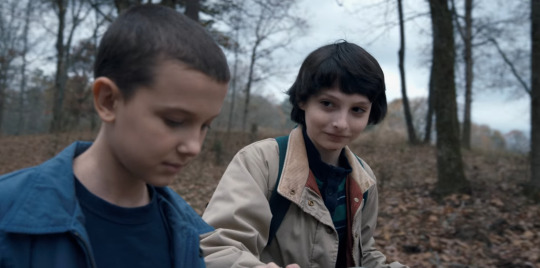

look. that's the same look. right?
let's take a closer look. to do that, i'm gonna have to zoom in a bit on the first one. because, as you can immediately see, the shots are slightly different. the first is a little farther away, showing both mike and el, walking next to each other, whereas the second is much more intimate, a closeup on mike's expression as he looks at will's face in the foreground. a minor but telling difference about the levels of emotional intimacy in each scene.
so, moving past that first element of contrast, let's look at each shot in full, because in both of these scenes, mike goes on a bit of a face journey before he gets to that final smiling expression, seen above.

personally, i think studying actors' body language and micro-expressions is inconclusive at best, but i won't deny that these look similar. however, it's pretty clear to me that they aren't the same.
toward el, i see confusion, intrigue, maybe pleasant surprise, followed by a glance down (to emotionally process and/or watch his step), and then a nervous but friendly smile.

toward will, i see awe, relief, and overwhelming affection, followed by a shy glance down and a slight schooling of his slack jawed expression into a warm smile.
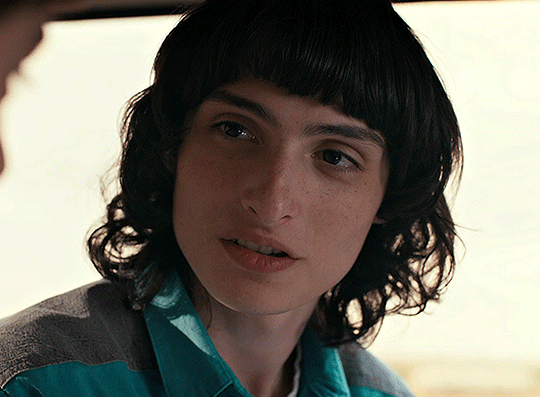
but, again, that's just my interpretation, and i can't say with any certainty what the intention of all of finn's micro-expressions are. but from my perspective, even a surface level viewing of these two expressions depicts a very different emotional experience. however: there's no denying the connection between these two scenes. they clearly mirror each other, just like a lot of things about mike's relationships with el and will mirror each other. i don't think that's an accident.
whatever you think his sexuality is, mike is undeniably in a romantic narrative with el. beginning in season one episode three, when the concept of their romantic relationship is introduced, the narrative arc mike and el share is heavily focused on that relationship. the first scene above actually happens in that same episode (s1e3), not coincidentally almost directly afterward. and the former scene, with mike, lucas, and dustin behind the baseball field, provides very interesting context for several reasons:
first: bear with me, because we're going back to look at the context behind this context. this is only episode three of the show, but already there's a lot going on, both in text and subtext.

and since we have the entirety of their relationship so far presented to us on screen, when lucas accuses mike of looking at el romantically, we're easily able to go back and figure out where he got that impression: we can examine every time lucas has seen mike look at el at all.
the first night, after finding el in the woods instead of will, and while insisting that the next day she'd be gone and they could focus on will again, mike's behavior is directly reminiscent of benny's. taking el in, and providing her with shelter, food, and clothing.
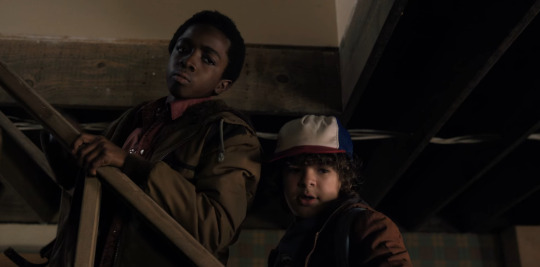
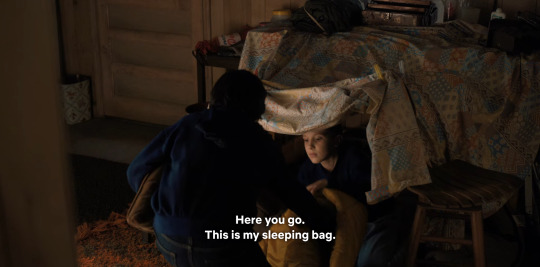
the next day, after learning that she's in danger and changing his mind about pawning her off on his mother, mike infers that she might know something about will. when lucas arrives, he exclaims that she recognized him and knew he was missing.
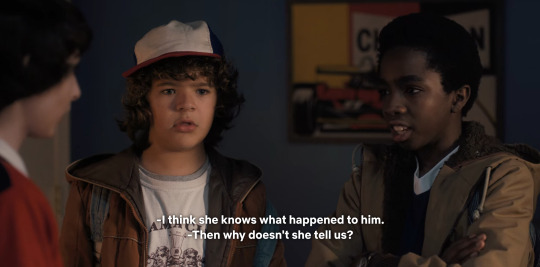
later, when lucas tells her that will is their friend, she asks what that means and mike explains. a friend...
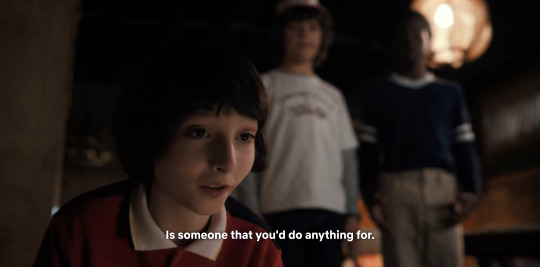
and then she displays that she might really be able to help them find will. and mike looks at her like this:
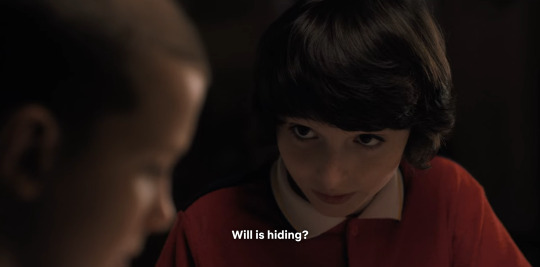
each and every one of these interactions is directly related to will. but lucas, through the omnipresent lens of heteronormativity that surrounds boys' interactions with girls (especially a group of boys who have no experience with girls... more on that in a bit), only seems to consider the fact that mike's behavior, which is undeniably about will, is being directed at el.
throughout season one (and beyond, in more subtle ways), will and el are repeatedly connected to each other through the trope of mistaken identity. will is abducted on the same night (and due to the same series of events) that el escapes the lab. hopper, in his investigation into will's disappearance, keeps running into clues about el. and mike, lucas, and dustin, sneaking out in episode one to search for will, find el instead.
later in the season, hopper eventually realizes the truth of his own more overt mistaken identity arc: while he was under the assumption that he'd been following will's trail, he'd actually been following el's. interestingly, the realization is triggered by one specific distinguishing difference, which tells him beyond a doubt that he's been looking for two different kids: their art.
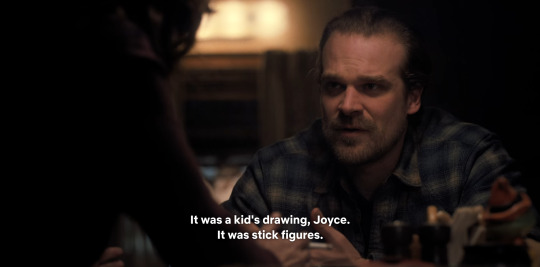
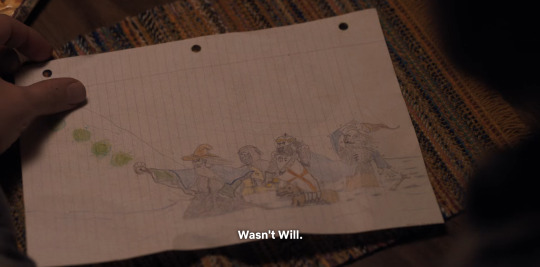
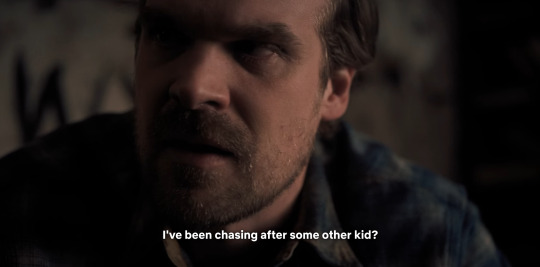
though much more subtle (aka hidden in the subtext), mike's arc with his feelings about will and el follows a very similar pattern. the main difference, though, is that in season one, the swapping of places is eventually reversed but never acknowledged as such, and mike ends season one with el now missing and will back in his life, but a lingering sense of something yet unresolved.
second: (i'm not going to deep dive into this one here, because it's a whole analysis in and of itself, but i need to mention it because it is relevant) this scene introduces the recurring motif of superheroes being directly connected to mike's feelings for el, which is an association we see follow them all the way into season four and become a defining metaphor for their incompatibility.

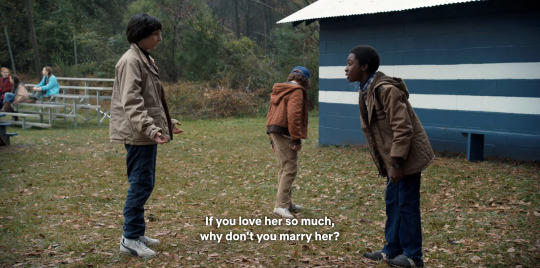
third: lucas is the character who first introduces mike's romantic feelings for el into the narrative. and instead of giving any indication that lucas' interpretation is correct, mike's reaction is... difficult to read. his response is immediately defensive, both verbally ("what are you talking about?" "shut up, lucas,") and physically (leaning away and shielding himself when lucas hugs him). we can infer from the original character descriptions why mike might be defensive about this subject:

obviously, this description is only a vague impression of what Mike Wheeler became, but it's clear that the core elements of his character outlined here did come to fruition on screen. here, mike's insecurity is linked both to the bullying he undergoes, and to his inexperience/ineptitude with girls. and it's presented as key to his character motivation (the original concept of his character arc put forth here is very straightforward: at the start, mike has insecurity centered around bullying and is romantically inexperienced. by the end, mike has courage against monsters and romantic experience.)
in any case, this scene is the first hint of this aspect of mike's character in the show itself (the earlier scene of bullying in the show focusing on mike consoling dustin over what he’s being bullied for (“i think it's kinda cool. it’s like you have superpowers or something!”)... see my last point here… mike holds the idea of superpowers in high regard, and they are consistently connected with his feelings about el. something about the mistaken identity through-line feels apt here: mike mistakes his feelings of admiration for el as feelings of romance.) in this scene, mike is confronted with both romance (in direct relation to himself for the first time in the show) and bullying.
but due to the way this is shot, it's impossible to get a read on what mike is truly feeling. it reminds me a lot of another scene, actually...

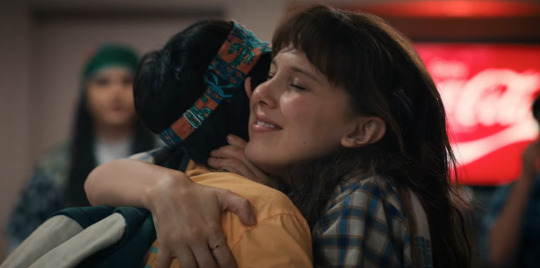
in both of these scenes, mike's genuine emotional reaction is hidden from us. in the first, lucas forcibly hugs him, teasing him about how much he "loves" el, and in effect introducing the idea of el as a romantic prospect to mike. in the second, el hugs mike tightly, her hand still around his neck from their kiss and his arm trapped in between them, similar to the way he shields himself from lucas. we're then shown that he's signed the card on the flowers squished between them "from, mike." hm. so... not love, as lucas suggests.
we come to learn over the course of season four that this is something mike is actively struggling with: his inability to "love" el in the way that she wants, expects, and deserves. this scene, introducing that season-long arc, conceals mike's true emotional state and motivations from us, again, mirroring the first introduction to their entire romantic plot line way back in season one.
(an aside: lucas' "if you love her so much, [then] why don't you marry her?" aka the inciting event of their romantic arc, is a based on a conditional statement with the hypothesis that mike loves el. as mr. clarke might posit (in, say, season one, episode one): what's the difference between an experiment and other forms of science investigation? ...well, an experiment is a controlled test of two or more variables against a hypothesis. does that remind you of anything happening in mike's romantic narrative? something about...... [murray voice] experimenting sexually?)
anyway. then, after extracting himself from el's embrace, mike finally drops his bag(gage) and opens his now empty arms to will, before preemptively cutting himself short with a punch to the shoulder.
...did someone say internalized homophobia?
and then immediately upon being introduced to argyle, mike is called out for his presentation here not being genuine. ("it's a shitty knock-off,"/"i really thought it was ocean pacific...") we're being told that something about mike's performance is not what it seems (and may even be a case of one thing being mistaken for something else).
and speaking of homophobia...
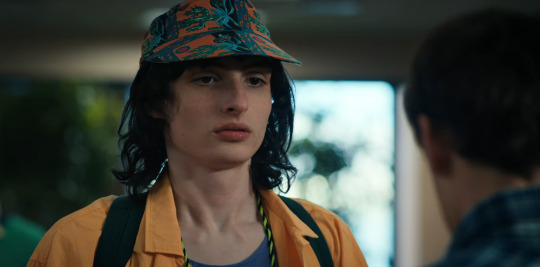
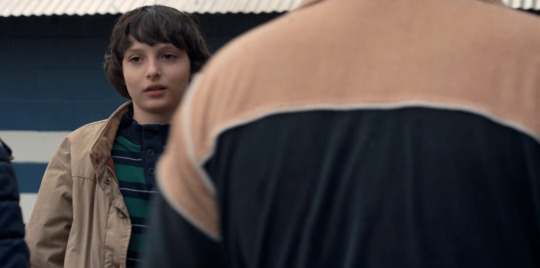
fourth (and finally): this scene, of lucas' teasing mike about his "love" for el, which i'll remind you again is tied directly to lucas mistaking mike's behavior regarding will as being solely about el, is quickly interrupted by an onslaught of homophobia, during which mike is specifically targeted (read: tripped) by the bullies.
the juxtaposition is immediate and obvious: mike's friends lovingly teasing him, even embracing him, over a crush on a girl vs. bullies maliciously taunting them about will being killed for being queer and then physically harming mike.
(there's also something to be said about the later scene in which these bullies force mike to drop his bike in the woods and chase him to the edge of the quarry, mirroring exactly how the cops assume will must have died... and, to be clear, i'm not saying that mike himself is being bullied for being queer in the way will was. no, mike's queerness is invisible to those around him in a way that will's isn't, so his relationship with it and the ways it affects him are hidden in subtext.)
which brings us directly to the following scene in the woods. el asks about mike's injury (sustained from the aforementioned bullying, thereby linking these two scenes even more concretely) and with a little prodding ("friends don't lie"), he opens up to her about what happened, and about being bullied at school. she listens, tells him she understands (this also follows her recent flashback of brenner's abuse in the lab), and they share a "cool," "cool," and a smile.
so... let's quickly jump over from here to the van scene with will. something similar, yet notably different, is happening in this scene, leading up to that infamous smile at the end. mike is sharing his insecurities with will now, but instead of will prodding him to open up, mike, prompted only by will's "she's gonna be okay," begins rambling so much about his insecurities (while speaking in superhero metaphors) that he eventually cuts himself off, saying it's "stupid." instead of letting him brush it off, will guesses exactly what mike is afraid of: "you're scared of losing her." he gives him The Painting (a symbol of his love for mike) and a long speech about feeling lost and different, while insisting upon mike's value (you're the heart, leading us, inspiring us, etc). and then they share a "yeah?" "yeah," and a smile.
so we can see the similarity in the way the shots are set up, the progression of the conversations, and mike's visible reactions. but we can also see distinct differences, all of which together inform a significant difference in emotional weight between these two scenes.
while mike's conversation in the woods with el takes place in the third episode of season one, at which point mike has known her for less than 48 hours, the van scene is in the second to last episode of season four, and is the fourth of five heart-to-hearts mike and will have this season alone (and following three previous seasons and beyond that years of close friendship). it is also arguably the climax of their shared arc this season. on the other hand, mike and el's season one moment is part of the introduction to their storyline, and the introduction to their romantic arc. in this moment in the woods, mike is looking at el romantically (did you think i was gonna argue that he isn't? because no, he definitely is). in fact, this is the beginning of mike's entire romantic arc, which sets out to address the foundational insecurity that is key to his character. we, as an audience, right alongside mike, have just been told (by lucas) that mike has romantic feelings for el. and then we are presented with this scene. we are supposed to view this as romantic. because mike is starting to view it as romantic.
had stranger things been one season long, then the climax of their romantic arc would have been the kiss they share in the cafeteria, followed by the denouement of el's symbolic death (the gay implications of which i could write another whole essay on...). but the end of season one was not the resolution of mike's full romantic arc. by the nature of the five act structure (which is what stranger things has, being five seasons), the entirety of season one serves as exposition for our full narrative. which means, in effect, that the entire arc of mike and el's season one relationship is there to serve as groundwork, a foundation for mike's complete five season arc. season one, starting from before he even meets el, all the way through to when he eventually kisses her and then loses her, is only act one of that arc. the first act of five act structure is when the driving conflict is presented. so in the context of the entire show, for us as the viewer, mike's narrative arc surrounding the romantic aspect of his insecurity begins with his season one "romance" with el.
and we know that this insecurity is an element of the full five-act narrative, rather than being presented and wrapped in the course of the mini "self contained" narrative of season one, because we can see plainly, three seasons later, particularly during mike's heart-to-hearts with will, that this insecurity has not yet been resolved. we know this, on a basic level, from having watched mike and el's relationship struggles progress, but it is still explicitly laid out for us in season four. and will is consistently the only person who genuinely hears mike out, encourages him to open up, and addresses his insecurities, instead of brushing him off, like most other people in his life (including will at some points) have done. will understands him in a way el only claimed to in season one.
looking back to the character outline: mike has now "kiss[ed] a girl" and even "had a girlfriend" and still hasn't resolved his insecurities even remotely. in fact, after the first season arc wraps up, this romantic relationship becomes the main source of that insecurity. his difficulty navigating a real romantic relationship with el is the basis of their arc in season three. and by season four, mike is consciously struggling with being unable to tell el that he loves her. despite will's reassurances that things will be okay (which stack onto lucas' constant relationship advice in season three), mike keeps circling back around to it. because he can't move forward on the path he is on.
he has reached a point of no return, like a “fight you can’t come back from.” he is unable to find the security he is searching for in his romantic relationship with el... and this is where we arrive back at the van scene with will.
if the scene in the woods marks the beginning of the introduction of mike's romantic arc, then the scene in the van marks the beginning of the conclusion of mike's romantic arc. if the introduction of his romantic arc (season one) presents his insecurity, then the natural conclusion of that arc (season five) is security. throughout season four, mike lays out for will the insecurity that his relationship with el still brings him. he is unable to find that security with el, and, in the van scene, finds it with will instead.
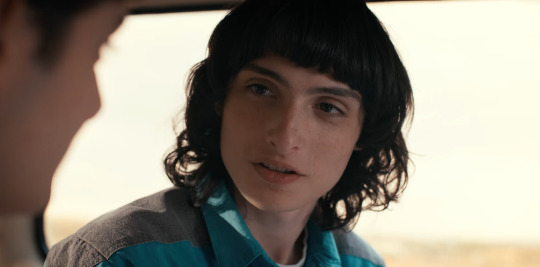
or, should i say, begins the journey to finding it. because, especially after the lie that brings them into that moment, and then traumatic pizza dough freezer incident, we're still at the beginning of the conclusion. there's still a lot to resolve, but season four (alongside mike, who now understands what he's been going through) finally began moving the subtext of mike's arc into the actual text. and this moment indicates that season five will take that next step to fully, textually, actualizing it.
so, getting back to the parallel we're looking at here: each of these scenes is a catalyzing moment in mike's romantic arc. in season one, when lucas suggests that mike has a crush on el, and then what follows is a conversation with el where she is (to quote lucas) "not grossed out" by him, he actively begins his journey toward resolving this character motivating insecurity. he looks at el and he sees the possibility of romance.
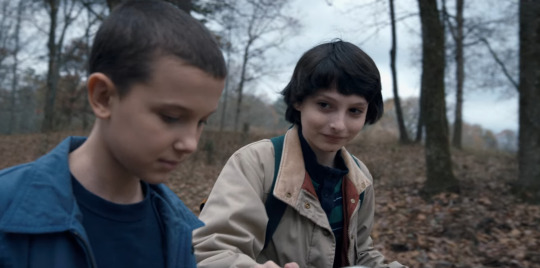
and just look at him. he looks excited. hopeful. a little nervous. but... i want to remind you again: mike has known el for less than 48 hours at this point. this is the first conversation they've had in which they've related to each other as equals. for their entire relationship before this and afterward, outside of their romantic interactions (and also. often. disturbingly. concurrent with their romantic interactions...), mike's role has been as el's protector, a makeshift father figure, the elliot to her E.T. here, though, el tells mike that she understands him.
in season one, mike is twelve years old (read: pre-pubescent). he has no personal understanding of or experience with romance. dustin starts to comment in s1e2, "you're letting a girl...?" and ted later scoffs "our son with a girl?" and outside of the queer coding, what we can take from both of these (which draw back to the original character description) is that mike has no experience with girls whatsoever. (outside of, you know. family. but that's not what this post is about.)
and again, this scene happens almost directly after lucas first introduces the idea of romance between them, both to the narrative, and to mike himself, who, very significantly, up until this point, has shown no romantic interest in el. the sequence of these events is not a coincidence. 1. lucas assumes mike has romantic feelings for el. 2. el and mike have a moment of personal connection and understanding 3. mike "boys only" wheeler puts these two together and assumes the connection between them must be romance. but the expression on mike's face here isn't a representation of already existing romantic feelings. there's no basis for those. again, this moment represents for mike the potential for romance.
which... makes his expression in the van scene hit even harder. because unlike el, will isn't a stranger he barely knows, but rather his best friend of ten years. and it isn't lucas telling mike how mike feels. it's will professing his own feelings about mike, in direct response to mike's self-professed insecurities. (ding ding ding, are your alarm bells going off?) mike's expression at the end of this scene, if we're viewing it as a reprise of his season one expression, is a representation of hope for his romantic future. but this time, heading into the resolution of mike's romantic arc, with all of the knowledge and context we (and mike) have gained over the course of the past four seasons, it's directed at will.
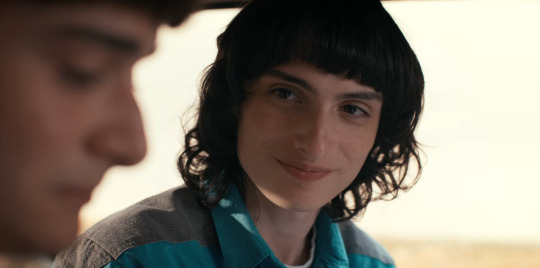
ok. so. with the basic connection between these two scenes established, i'm gonna move a little bit sideways here. at the end of their romantic arc in season one, el disappears from mike's life and will reappears in it, effectively swapping their places (remember that we've been dealing with the mistaken identity trope between these two), and leaving the question of mike's romantic security glaringly unresolved.
and we know why - this is a five act narrative we're watching - but just within the context of the season one arc... the climactic moment of mike finally asking the girl to be his sister kissing the girl was preceded by her locating will in the upside down (leading to his rescue) and followed by a resolution in which she disappeared... and will took her place. at the end of the season, mike is left in the same place he started: playing games in his basement with will, his first attempt to resolve his arc of romantic insecurity, with el, ultimately ending in tragedy.
after season one, this arc picks up again, but this time will is the one present in mike's life. and mike's behaviors toward el in season one, during which they were undergoing a romantic story arc, begin showing up again in his behavior toward will. but unlike with el, mike's particular (read: romantic) behavior toward will happens without outside intervention, and in fact, often in spite of outside intervention. now, this isn't to say that all of mike's behavior with el was a result of others' influence. when el reveals to mike that she is on the run from "bad people," mike is immediately protective and caring toward her. however, as i've already explained, this caring behavior (which, again, we know right off the bat is not romantic because it directly mirrors the way both benny and hopper care for her) doesn't turn into romantic behavior until lucas introduces that idea.
on the opposite side of the spectrum, right from episode one of season one, mike's behavior toward will is fully self motivated, even in the face of opposition.
and as we move through season one and beyond, we can see that mike continues to rely on constant guidance in the way he cares about el (particularly and most consistently from lucas).
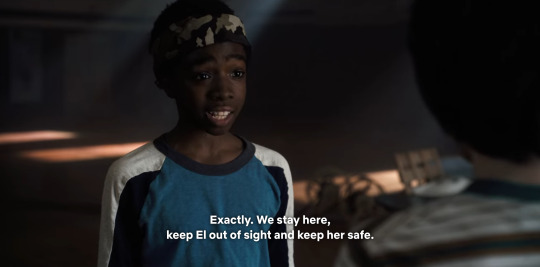


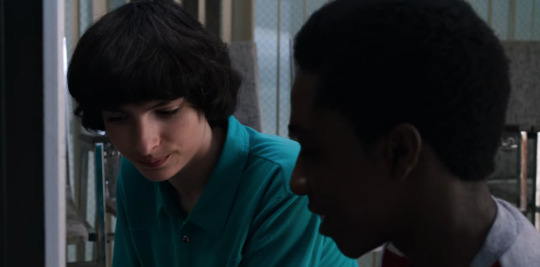
stranger things is, at it's horror filled core, a coming of age tale. like many of our other characters, mike's full character arc, romantic and otherwise, is about self-actualization. from the very conception of the show, his insecurity is presented as a central character flaw to overcome, while also being directly linked with his romantic fulfillment. the overcoming of this fatal flaw, the resolution of his romantic arc, and his final achievement of self-actualization are all inextricably intertwined.
the reprisal of this specific expression of romantic hope as we enter the end of mike's romantic arc is not an indication that mike is in the same place emotionally at the end of season four as he was at the beginning of season one, just with a different person now. instead, it is an indication of his romantic arc coming full circle. mike began in a position of hope for his romantic future with el, only to have the actualization of that hope (their romantic relationship) gradually degrade his romantic fulfillment and self-esteem. the longer mike and el are together, and the more serious their romantic relationship becomes, the worse mike's insecurities become. this is, i would argue, directly related to the fact that mike's pursuit of a romantic relationship with el is not due to his own genuine desire, but instead a combined result of heteronormativity (lucas assuming mike's feelings for el to be romantic), compulsive heterosexuality (mike's subsequent assumption that his feelings for el must be romantic), forced conformity (mike's attempt to resolve his insecurities firmly within these heteronormative boundaries, under the assumption that a rejection of these boundaries is unacceptable), and the trope of mistaken identity that has been following will and el since season one.
and of course i don't know with any concrete certainty what season five will contain, but based on the narrative so far, and optimistically expecting a satisfying resolution to his character arc, the actualization of his romantic hope regarding will is going to lead to true romantic fulfillment and coincide with his self-actualization (a big part of which is coming to terms with his sexuality).
now, i'm not going to conclude this whole analysis by saying, "and that's why mike is gay!" because while i think this all is a good indication of that, based on all of the context and my impression that this narrative is being presented in a way that focuses on the subtext and deeper symbolism of each of these relationships rather than being a case of specifically el vs. will, you might still have a different interpretation than me. that's fine. however, i am going to end by insisting (me when i argue with the wall), based on everything i've laid out, that this parallel and others like it (ie parallels between byler & miIeven's romantic arcs) are not evidence of mike's feelings, specifically whether they are genuinely romantic or not. this parallel serves as a narrative device in his romantic character arc... the conclusion of which is mike realizing and coming to terms with the fact that he is actually in love with will, and not el.
just to be very clear, i'm not saying these parallels alone are proof against mike being bisexual, but i am saying that they are not evidence in support of his being bisexual. again: they do not indicate that mike is romantically attracted to el. what they indicate is that will and el are foils in mike's romantic arc.
before i finish, i want to address a couple misconceptions:
1. the fact that mike actively and willingly participates in a romantic relationship with a woman means he can’t be gay. this is straight up homophobia. gold star bullshit. no.
2. mike and el being presented in a romantic light means that they have genuine romantic feelings for each other. this is a misconception of the way narrative tools are used to tell a story. going right back to my first point: it is an irrefutable fact that many gay people have romantic relationships with the people of different genders (read “the opposite sex”) before they come out/realize their true sexuality. it is also a fact that many of these gay people fully believe their feelings to be genuinely romantic before realizing that they are not. as i've already gone over, mike is twelve years old when his romantic arc begins. on the surface, his relationship with el is presented as romantic. he participates in (and even initiates) romantic behaviors because he believes that his feelings for el are romantic. in seasons one and two, mike is one of our main POV characters. we can see a romantic tilt to the way some of their scenes are shot because, to mike, while they are happening, they are romantic (keeping in mind what i said before about mike having no experience and therefore no personal knowledge informing his perspective, AND keeping in mind that many of these on-the-surface "romantic" scenes are also consistently subtextually linked (read: paralleled) to familial relationships for both of them... and i haven't even touched the cultural context surrounding homosexuality in 80's. there's so much nuance informing the way this story is being told). and we, as the audience, are supposed to read them as romantic on first viewing, because otherwise the season five plot twist, revealing the truth of mike's feelings, would not work.
it is not a coincidence that the active degradation of their romantic relationship (outside of all of the other context, parallels, symbolism, family coding, etc, that are there to hint along the way that things are not as they might seem) begins full force in season three, at the exact point when the two actually enter a real relationship for the first time, and also when our characters are entering puberty, the time during which a person's sexuality (in a general sense, but also in regard to sexual orientation) begins to fully emerge. after his season one arc with el, mike underwent another season-long romantic arc: this time, with will. it's more subtle, because (i believe) mike doesn't realize yet that it's romantic, but it's there. then at the end of season two, mike makes a choice: he encourages will to dance with a girl and he dances with el, re-writing their tragic ending from season one, but now leaving his romantic arc with will frustratingly unresolved, again mirroring the sense of unresolution from season one: mike has swapped out the end of each romantic arc with the wrong love interest.
and then in season three, now having had the experience of both romantic arcs, and now, for the first time, with both will and el right there beside him, all we can see anymore is the overt contrast between the two relationships, depicted most blatantly through the same type of visual and narrative "parallel" we've been looking at here.
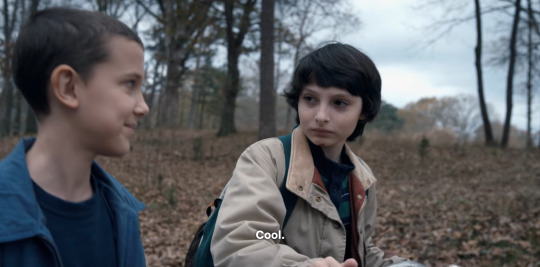
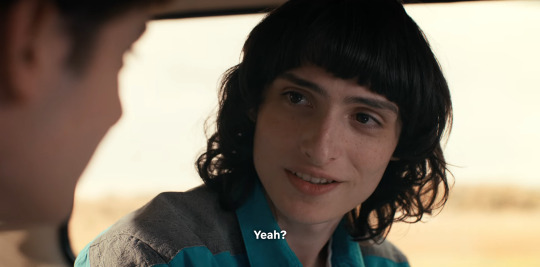
but at the end of this season, instead of making a choice, mike's choice is made for him. he has a romantic moment with will, and then el kisses him, confusing the resolution of these two romantic arcs once again.
mike's season four arc closely mirrors his season one arc (searching for one love interest with the other by his side, mistaken identity trope abound), but with important distinctions: 1. mike is a little older, a lot more experienced, and has a better understanding of both the context of romantic relationships and the scope of his feelings for both el and will. and 2. mike's only real guidance in season four comes from will, and he doesn't simply listen and act based on will's advice, as he did with lucas' in seasons 1&3. now, he fully engages with will's input, pushing back against it when he doesn't agree, and accepting it when he can acknowledge its truth (up until, of course, our fourth (and hopefully final) tragic, incorrectly resolved ending). mike is finally taking control of his romantic narrative in a way he hasn't previously, and the direction it's heading in now is toward security, self-actualization, and will.
so the point of all of this is: nothing is as simple or straightforward as it may seem on the surface. the narrative has always been deeply complex and layered with subtext and symbolism. and most of all, when interpreting the meaning of anything presented directly to us on screen, context matters.
also uh. yeah, mike gay
#stranger things#stranger things 4#byler#will byers#mike wheeler#mike wheeler is gay#mike wheeler is a gay mess#forced conformity#heteronomativity sucks
835 notes
·
View notes
Text
me when gay people are gay (i am somehow homonormative and heteronormative at the same time)
#like fr i assume every person i see on the streets is queer to some capacity#this implies their is a container full of queerness#*there#but when i see queers out and about i be like#*insert pikachu meme*#even though i already assumed that#it's a real problem#need to get rid of these heteronomative ideals#so i can go back to being homonormative#the way god intended#🇺🇲#i am not in fact an american#freddos orginals
0 notes
Text
The phrase “Man’s Man” is the gayest phrase I’ve ever heard.
Like, the harder someone tries to adhere to gender roles to assume heterosexuality the more homosexual they sound.
0 notes
Note
hi hi happy STS!! what are your favorite type of relationships/dynamics to write? it can be tropes or specific kind of bonds or anything, I just wanna know what you're especially fond of in terms of relationship types :)
Hiii thanks Cee! 💕
For me it'd def have to be the purely platonic friendship of a guy and girl. Just absolute chaotic besties <3
I'm aro so the thought of fucking with ppl and making it seem that they might get together only to have them become even better friends fill me with glee 💖
0 notes
Text

"oh please everyone has gay thoughts sometimes" so what i'm hearing is that heteronormativity is so ingrained that a significant percentage of the population regularly experiences bisexual attraction? but dismisses it as something that all straight people experience? this is so concerning are you guys okay
25K notes
·
View notes
Text
damn that’s.. a lot


#stranger things#platonic elmike#byler#el hopper#will byers#mike wheeler#mike wheeler is gay#forced conformity#heteronomativity sucks
42 notes
·
View notes
Note
Do you have any reading recs on the construction of ASPD/psychopathy as a diagnosis and its relationship with the prison industrial complex
Disordered Personalities and Crime: An analysis of the history of moral insanity (2015), David W. Jones
The Myth of the Born Criminal: Psychopathy, Neurobiology, and the Creation of the Modern Degenerate (2015), Jarkko Jalava, Stephanie Griffiths, & Michael Maraun
"Vom «autistischen Psychopathen» zum Autismusspektrum. Verhaltensdiagnostik und Persönlichkeitsbehauptung in der Geschichte des Autismus," Rüdiger Graf. Gesnerus 77.2 (2020), 279–311 DOI 10.24894/Gesn-de.2020.77012
"From Psyche to Soma? Changing Accounts of Antisocial Personality Disorders in the American Journal of Psychiatry," Martyn Pickersgill. History of Psychiatry 21 (2010), 294–311
"'Born Criminals,' 'Degenerates' and 'Psychopaths': On the History of Criminal Psychology in Germany." Heinz G. Schott. In Transaction in Medicine & Heteronomous Modernization: Germany, Japan, Korea and Taiwan (2009), ed. Alfons Labisch & Shizu Sakai
"Einführung: Zur Zeitgeschichte «abnormer Persönlichkeiten»," Alexa Geisthövel. Gesnerus 77.2 (2020), 173–205 DOI 10.24894/Gesn-de.2020.77009
"A Drifting Concept for an Unruly Menace: A History of Psychopathy in Germany," Greg Eghigian. Isis 106.2 (2015), 283–309 DOI: 10.1086/681994
"Badness, Madness and the Brain—The Late 19th-Century Controversy on Immoral Persons and Their Malfunctioning Brains," Felix Schirmann. History of the Human Sciences 26.2 (2013), 33–50 DOI 10.1177/0952695113482317
"Epilepsy, violence, and crime. A historical analysis," Júlia Gyimesi. Journal of the History of the Behavioral Sciences 58.1 (2022), 42–58 DOI: 10.1002/jhbs.22117
"Descontinuidades e ressurgências: entre o normal e o patológico na teoria do controle social," Francis Moraes de Almeida. História, Ciências, Saúde-Manguinhos 20.3 (2013), 1057–1078 DOI 10.1590/S0104-597020130003000017
"A History of Changes to the Criminal Personality in the DSM," Jessica Gurley. History of Psychology 12 (2009), 285–304 DOI 10.1037/a0018101
"Criminal Propensities: Psychiatry, Classification and Imprisonment in New York State 1916–1940," Stephen Garton. Social History of Medicine 23 (2010), 79–97
A socio-legal history of the psychopathic offender legislation in the United States (1974), Aldo Piperno (diss.)
100 notes
·
View notes